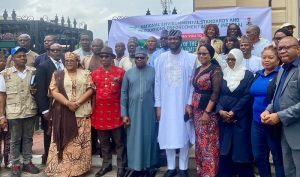In keeping with its goal of providing all Nigerians with a healthy and sustainable standard of living, the federal government has announced new guidelines to promote the responsible consumption and sound management of batteries in the country.

The regulation, which was officially launched on Thursday, August 29, 2024, in Abuja, Nigeria’s capital, covers all types of batteries throughout their life cycle, from production, usage, collection, transportation, storage, recycling, and disposal. This procedure is applied to both new and used batteries.
Speaking at the unveiling ceremony organised by his organisation in collaboration with the Nigerian Energy Support Programme (NESP) and funded by the European Union, Dr. Innocent Barikor, Director General of the National Environmental Standards and Regulations Enforcement Agency (NESREA), identified the lack of specific legislation that addresses emerging complexities and challenges as one of the main obstacles confronting any enforcement effort in the battery sector.
According to him, the continuous misuse and mishandling of used lead acid batteries (ULABs) exposes users to serious health risks that affect various body systems, including the neurologic and cardiovascular, due to the presence of highly hazardous chemicals and materials such as lead, mercury, cadmium, and lithium, among others.
However, he did convey a great deal of optimism when he stated that the recently announced actions would help in closing the gaps in the elimination of unsound environmental practices throughout the whole battery value chain, especially with regard to women and children who are disproportionately involved in the improper handling of these dangerous materials.
“The Battery Control Regulation will support the Nigerian Government’s efforts to ensure sustainable handling of waste batteries, mostly resulting from the accelerated use of renewable energy solutions, such as solar home systems and mini-grids, which promote energy access in unserved and underserved areas in the country,” the NESREA’s chieftain said.
In the same vein, Nigeria’s Minister of Environment, Balarabe Lawal, condemned the indiscriminate disposal of battery waste in unauthorised sites without adequate permission, a risky practice that he said must be stopped immediately to protect the country from uncontrollably high environmental disruptions in the future.
Consequently, the minister told the participants that the introduction of these regulations is a glaring example of Nigeria’s adherence to international accords like the Bamako Convention on the Ban of the Import into Africa and the Control of Transboundary Movement and Management of Hazardous Wastes within Africa, which requires the country to align its national aspirations with global standards for the safe handling, recycling, and disposal of used batteries.
“This regulation,” according to him, “is part of the administration’s efforts to promote the practice of battery waste disposal in an internationally standardised nature, further facilitating and creating an enabling environment for deploying renewable projects that boost the Nigerian economy.”
Mr. Duke Benjamin, NESP’s Head of Programme, said this landmark achievement will go a long way in regulating the activities of the battery waste disposal industry across the country.
“It will also identify the roles of relevant stakeholders whose efforts would greatly contribute to reducing the release of toxic chemicals in the atmosphere along different levels of the value chain,” he noted, with a promise that the NESP will continue to provide technical support and capacity development to various NESREA and battery recycling facilities in partnership with the nation’s environment ministry to ensure sustainability in enforcing the newly enacted regulations.
By Etta Michael Bisong, Abuja
